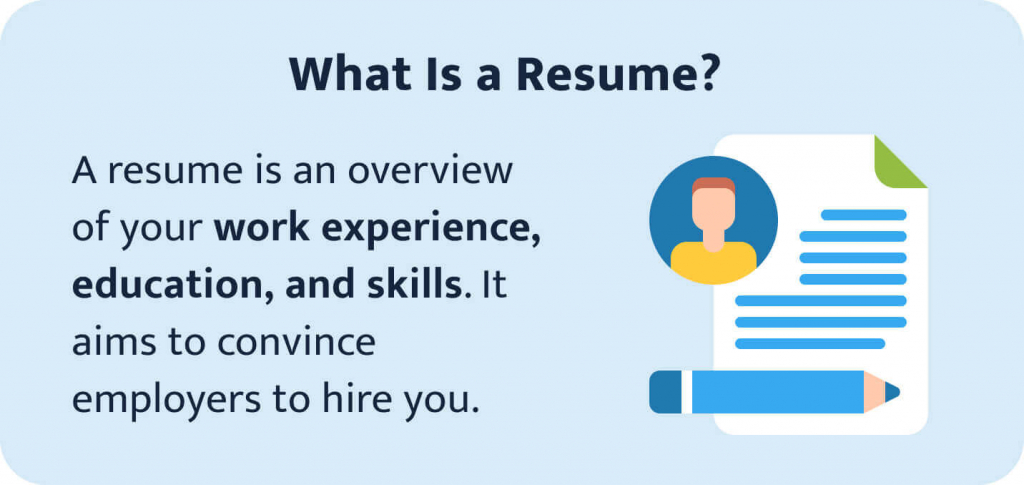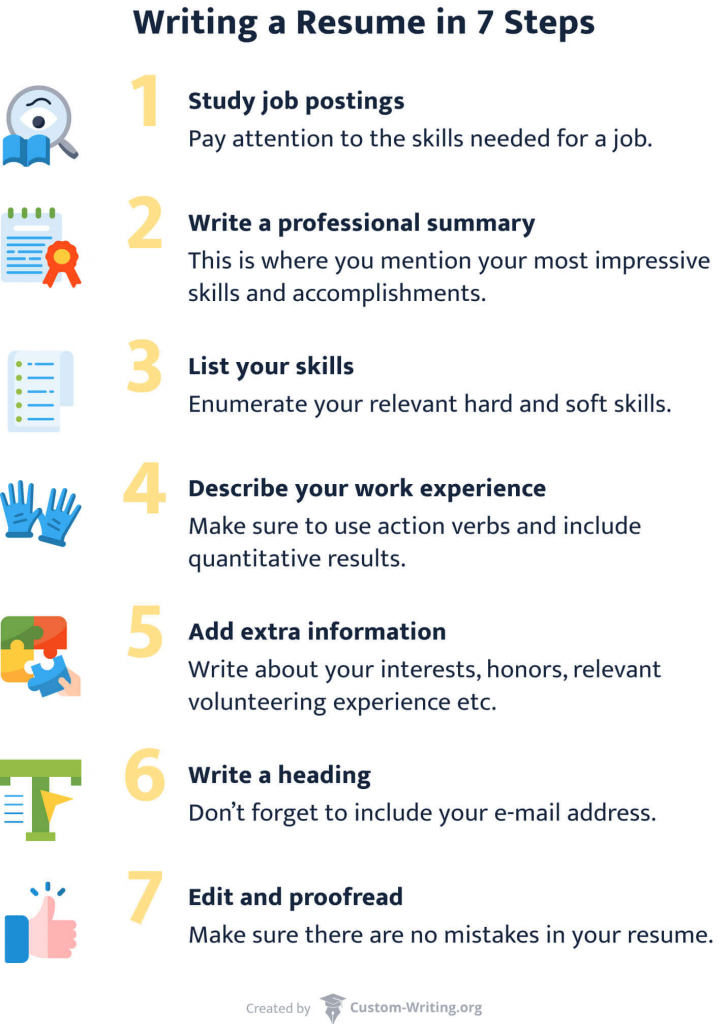Almost everyone feels insecure when they start working on their first resume. Suddenly, innumerable questions occur and need to be answered. What should I write? How should I do it? What must I include in my resume to make it winning?

If you’re looking for answers to CV-related questions, you’ve come to the right place. This article by Custom-Writing.org will show you how to make a fantastic resume that will help you get a job even without prior experience.
📝 What Is the Purpose of a Resume?
Essentially, a resume is a document that underlines your professional abilities and qualifications. It encompasses your work experience, education, and achievements related to the job you want to get. Sometimes, a cover letter is attached to a resume to showcase your suitability for the role.
One widespread error people make is that they try to cover everything about themselves in the document. It’s okay and even essential to share some info about your character traits, hobbies, and experiences. But it’s crucial to remember that a resume’s principal aim is to convince companies that you are worth interviewing and employing. That’s why everything you add needs to be relevant to the job.
🛠️ Key Resume Elements: Hard & Soft Skills
There’s a widespread belief that the “experience” part is the principal component of a resume. Nevertheless, we suggest you concentrate on the hard and soft skills instead. In recent years, employers have begun to give particular consideration to these two criteria when examining candidates.
What is the difference between hard and soft skills? Well, it’s simple:
- Soft skills are abilities that are not limited to a singular job. For instance, communication or management skills are valued in any firm. Individuals who possess these qualities automatically become more attractive to potential employers.
- Hard skills are technical abilities required for the job. A prime example is computer literacy, which is necessary for software developers. Apart from being professional and well-organized, they need to know how to work with IT and have a set of related aptitudes.
Even though it may seem soft skills in the workplace pose less value, this is far from reality. According to a recent GlobeNewswire survey, 73% of employers pay particular attention to candidates’ soft skills.
Top 10 Soft Skills for Any Job
As we’ve highlighted above, soft skills are universal and valued in every workplace, unlike hard skills. So, having them will make you a desirable professional and a terrific fit anywhere.
Here’s a list of top 10 soft skills to add to your resume:
- Work ethic demonstrates your dedication to the job. Such employees are highly appreciated, as they are well-organized, committed, and have brilliant performance.
- Communication involves more than just talking to your coworkers. It is also the capability to express and convey your point distinctly while staying professional.
- Self-awareness allows you to look at yourself from an outside viewpoint, see the situation for what it is, and work on self-improvement. This skill helps to create a harmonious environment in a workplace.
- Creativity is usually associated with art and visuals, but actually, it’s a broader term. It involves sub-skills like innovations and questioning. It allows you to be open to experiments.
- Attention to detail indicates your capability to be thorough and careful with details. It also increases the quality of your work.
- Adaptability determines how well you can embrace change and adjust.
- Time management skills show your ability to use time wisely and be as productive as possible.
- Problem-solving involves analysis, observation, logical reasoning, and decision-making. These will always help you find a way out and get the best possible outcome despite the circumstances.
- Teamwork helps you work successfully in a group, accomplish tasks, and build rapport with your associates.
- Conflict resolution skills involve your ability to settle disputes through negotiation. If you excel at conflict resolution, it benefits professional relationships and customer service.
✍️ Writing a Resume in 7 Steps
Being able to write a resume is a valuable skill that can help you get your dream job. This 7-step guide will help you to build a winning resume:

- Study job postings that suit you. Before you start working on an actual resume, search for suitable job openings and see what skills they generally require.
- Write a professional summary. A professional summary is a short section at the beginning of your resume highlighting your professional skills and expressing your career goals. You can write it as a paragraph or use bullet points.
Example:
- Skilled Business Management Specialist.
- Four years of experience in the field of human resource management, customer support, and administration.
- Worked closely with a Marketing Specialist to run advertisements and create social media content.
- Able to help the company explore sales opportunities to expand internationally.
- List your skills. Enumerate your crucial abilities, both soft and hard; focus on the skills mentioned in the job ad.
- Describe your work experience. When talking about employment history, don’t simply give a list of your responsibilities. Instead, it’s better to talk about your work’s impact on the company’s performance. Regardless of your role, try to find data or metrics that show the importance of your input.
- Add extra information. To help the company learn more about you, include some information related to your interests, volunteering experiences, honors, or language skills.
- Write a heading. The header of your resume needs to include information such as:
- Name,
- Phone number,
- A professional e-mail address,
- Links to your personal website, portfolios, and LinkedIn profile.
- Edit and proofread. Before submitting your resume, double-check all the essential information. Read the whole document once again and, if possible, send it to a trusted friend for some feedback.
👍 Tips for Building an Effective Resume
How can you make your resume appealing to HR and potential employers? Keep reading to find out!
Choosing a Suitable Format
Studies show that, on average, recruiters spend 6 seconds skimming over a resume. For that reason, the layout is something you want to pay special attention to. Start by choosing the most fitting format:
- Chronological. This format focuses on work experience. A chronological resume is perfect if you’re looking for a job in a field in which you have lots of previous experience. It is seen as a traditional resume template.
- Functional. The main focus of this format is your skills. A functional resume is suitable if you hope to find a creative job where skills are more important than your employment history.
- Combination. It’s a format that focuses on both your experience and skills. A combination resume is best if you’re applying for a highly specialized position requiring skills and expertise.
Using Bullet Points
Since recruiters don’t spend much time studying each resume, it’s best if the document’s layout is as simple as possible. Using bullet points is one of the ways to make your CV more readable. Bullet points are mainly suitable for chronological and combination formats, as these types of resumes involve a lot of lists.
The best strategy would be the following:
- List the information in order.
- Be specific about the details of your work.
- Use various action verbs.
It’s especially beneficial to use bullet points in the section dedicated to your employment history. For instance, you can add several sub-items that outline your responsibilities and achievements in your previous workplaces.
Choosing a Font
When it comes to fonts, the safest option is to choose the simplest, cleanest, and most legible ones. The most common and suitable fonts for a resume are Times New Roman, Arial, Calibri, Helvetica, and Cambria.
Serif fonts, for instance, are more traditional and formal, while Sans-serif ones are more modern. You can use these kinds of fonts to showcase your individuality. However, always keep in mind that simplicity is your number one priority. The required font size usually ranges from 10 to 12.
How to Put Your Skills on Your Resume
Now, let’s turn our attention to soft skills. What is the most effective way to present them in your resume? When you write about your soft skills, it might not be enough to simply state “communication” or “critical thinking.” It’s best to use specific vocabulary and pay attention to the required skills for the job.
Here are some examples of specific skills that you can mention:
Skill #1: Communication
What to write in your resume: Listening.
While communication is essential, most employers look for workers who can listen to others as well as express their own ideas. Listening is especially important in customer service jobs.
Skill #2: Critical thinking
What to write in your resume: Flexibility.
Employees that approach their work with a flexible mindset are highly valued. How you adapt to a changing environment or circumstances affects your performance as well as teamwork.
Skill #3: Teamwork
What to write in your resume: Collaboration.
Skills related to teamwork include your ability to negotiate, accept both positive and negative feedback, and collaborate with other team members. Collaboration skills enable you to successfully work towards a common goal with others and respect the diversity of your colleagues.
Skill #4: Work ethic
What to write in your resume: Organization.
An employee’s work ethic is fundamental to hiring managers. Organizational skills are crucial to keep the business running smoothly. Individuals with organizational skills are good at planning, prioritizing, and working towards a set goal.
What to Include in the Interests Section
Including hobbies and interests on your resume may help you demonstrate your individuality and unique skills. This can be especially useful to those with limited work experience. Consider the following hobbies for your resume:
- Sports.
Playing sports means being healthy and energetic. For that reason, it’s very attractive to employers if you include such activities in your list of hobbies. Additionally, being a team captain demonstrates your leadership and organizational skills. - Outdoor activities.
Similar to sports, outdoor activities like hiking or camping show employers that you are full of energy. If you get into nature in your spare time, it also suggests that you are less likely to get stressed and burnt out from work. - Art.
Interest in art demonstrates your creativity and an eye for detail. It’s especially beneficial to put art as one of your hobbies if you’re looking for a creative or design-focused job. - Volunteering.
Having volunteer work on your resume is an excellent way to show your community engagement and generosity. If you want to apply to a nonprofit organization or a company that values social responsibility, volunteering is a great option. - Languages.
The knowledge of foreign languages demonstrates your communication skills and dedication. This hobby is especially beneficial if you’re looking for jobs that involve global sales, tourism, or traveling. - Music.
Creating music or playing an instrument requires a lot of commitment, so adding this hobby shows your hard-working nature. If you are a band member, it may also help showcase your collaboration skills. It’s always safe to add music as a hobby; it demonstrates your openness and your ability to be patient.
Using Resume Keywords
Another thing to keep in mind while building your resume is keywords. Many companies use the Applicant Tracking System or ATS to scan every application and check them for keywords. To better understand what such words are and how to use them, take a look at these examples:
- Work experience keywords:
- Paperwork
- Algorithm
- Flowcharts
- High-quality.
- Skills keywords:
- Teamwork
- Creativity
- Coding language
- Attention to detail.
- Education keywords:
- Bachelor’s degree
- Master’s degree
- Fine Arts
- Majoring.
How do you determine which words recruiters and the ATS are expecting to find? Well, first, you need to scan the original ad for job-related words and highlight them. Choose those more relevant to your experience and the position you’re applying for, and add them to your resume.
Adding Action Words
When companies use the ATS to check resumes for keywords, they also scan them for action words. These words help attract attention to your achievements and make the document more readable. They serve as an excellent addition to keywords: they add some diversity and make your CV look even more appealing.
Excellent action words can be found in job descriptions similarly to keywords. Here are some examples that will spice up your resume:
✅ 9 Common Mistakes in Resumes & How to Avoid Them
Now that you know everything about composing a resume, it’s time to take a look at prevalent beginner mistakes and ways to prevent them:
1. Spelling errors and bad grammar.
This is probably the ultimate tip: the resume needs to have perfect grammar. If your document contains typos and grammar mistakes, you likely won’t produce the best impression on the hiring team. It’s best to proofread your resume or get somebody else to check it before sending it to your potential employer.
2. Exaggerations.
Writing that you are an expert in a program you’re barely familiar with may seem like a good idea. But if after getting the job you’ll be asked to perform an advanced task, you will probably regret your decision. Be honest about your skills; you can always improve them in the future.
3. Poor formatting and visual presentation.
Poor formatting has a significant impact on how your employers will perceive you. Before sending the document, look up some good resume examples or ask for advice.
4. Too generic.
If your resume is full of clichés, it will appear as if you have no original ideas. Try to be more imaginative: consider why the company will benefit from your skills.
5. Too long or too short.
Many applicants squeeze their experience onto one page, while others make their resumes too long. Try restricting yourself to two pages by choosing the most appropriate and interesting information.
6. Not tailored to a specific role.
Instead of creating a generic CV and sending it to many different employers, it’s better to devote time to each particular job and tailor your resume to fit the position. Read through the job description, pick appropriate keywords, and try to showcase your personality in a way that will convince the hiring team you are precisely who they’re looking for.
7. Too much personal information.
If the employer is not requiring information concerning your marital status, nationality, or religious beliefs, refrain from including it in your resume. Although this depends on the firm and the work you’re applying to, the rule of thumb is to avoid excessive personal details.
8. Buzzwords.
Language is essential in your resume. It’s best to avoid using trite phrasing such as “responsible for.” Rather, try to incorporate more action verbs. It will showcase your individuality and improve the overall quality of your resume.
9. Incorrect contact information.
Making mistakes in your contact info is usual and can be disastrous. Even if employers are interested in you, they will have no opportunity to reach out. That’s why it’s better to double-check all details before sending your resume.
🎓 Bonus Tips for Writing a Resume with No Job Experience
Your first resume is the most challenging one to write. You don’t have work history, and there’s not much relevant information you can include in the document. Is there a way to impress the HR team without having any experience?
Yes, there is! The goal is to underline your skills and achievements related to the job you aspire to get.
Here are the strategies you can use to impress your employer:
- Highlight your key abilities necessary for the position. If you don’t have an employment history, it’s worth focusing on your potential instead. Compile a list of relevant soft and hard skills at the beginning of your resume.
- Formulate an objective that fits the job description. Writing about your goals is a great alternative for graduates with no prior work experience. For example, you could write:
Example:
Result-oriented graduate with a bachelor’s degree in Fine Arts, seeking to develop innovative projects.
- Mention your achievements in the “education” section. Don’t simply state that you’ve completed education in a specific field. Instead, try to enumerate your accomplishments. You could include your GPA and key tidbits, such as being an active member of your university’s Heritage Conservation organization.
- Write about any relevant practice. Describe your volunteer experience or extracurricular activities that prove your skills and achievements.
- Mention any certificates you have. If you completed an online course or have certificates pertinent to the job you’re interested in, add them to your resume.
- Add a cover letter. Even if it’s not imperative, sending a short cover letter along with your CV is a welcome addition. It allows you to clarify why you are ideal for the job based on your talents and experiences.
If you like this article, feel free to leave a comment or share it with your friends. Best of luck with your resume!
🔍 References
- What Is the Purpose of a Resume?: Undercover Recruiter
- Top Soft Skills Employers Value With Examples: The Balance Careers
- How to Write a Resume: MyPerfectResume
- What Is the Purpose of a Résumé?: ESSEC
- Resume How-To Guide: The University of Maryland
- How to Write a Resume: Glassdoor Job Search
- What Is the Purpose of a Resume?: IEEE Computer Society
- 5 Biggest Resume Mistakes, According to Harvard Experts: International Business, World News & Global Stock Market Analysis
- 10 Common Resume Mistakes to Avoid: Forbes
- Resume Tips and Strategies: Free Online Learning at GCFGlobal
- 18 Résumé Writing Tips to Help You Stand Out: The Wall Street Journal
- Writing Your Resume: SEEK
- How to Write a Resumé That Will Actually Get a Recruiter’s Attention: LinkedIn
![How to Search the Web Effectively [For Students]](https://custom-writing.org/blog/wp-content/uploads/2022/08/hand-touching-with-search-icon-search-engine-optimisation-seo-concept-find-information-by-internet-connection-1-284x153.jpg)
![Top 25 Gadgets You Need to Study Smarter [from $20]](https://custom-writing.org/blog/wp-content/uploads/2022/06/sad-female-workaholic-keeps-hands-chin-busy-making-project-work-studies-papers-wears-elegant-white-shirt-sits-desktop-unknown-people-stretch-hands-with-notes-alarm-clock-smartphone-1-284x153.jpg)









